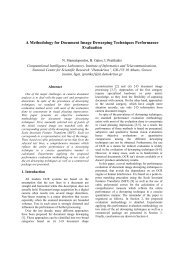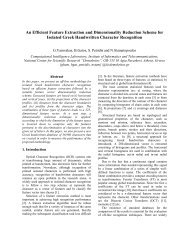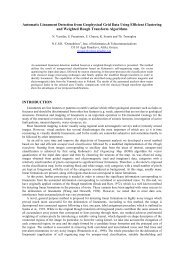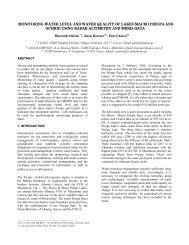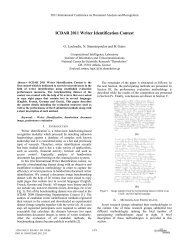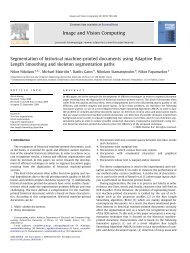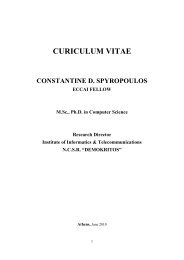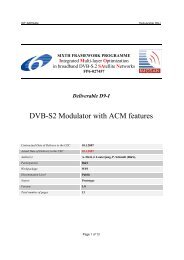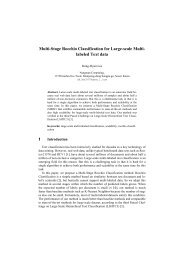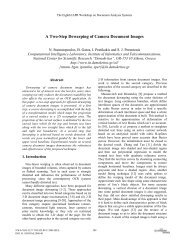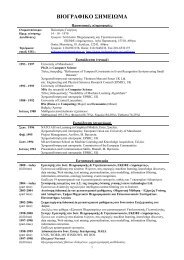TMS320C6713B Floating-Point Digital Signal Processor (Rev. A)
TMS320C6713B Floating-Point Digital Signal Processor (Rev. A)
TMS320C6713B Floating-Point Digital Signal Processor (Rev. A)
Create successful ePaper yourself
Turn your PDF publications into a flip-book with our unique Google optimized e-Paper software.
MULTICHANNEL BUFFERED SERIAL PORT TIMING (CONTINUED)<br />
SPRS294 − OCTOBER 2005<br />
switching characteristics over recommended operating conditions for McBSP †‡ (see Figure 59)<br />
NO.<br />
PARAMETER<br />
PYP-200,-225<br />
GDP/ZDP -225, -300<br />
PYPA -167, -200<br />
GDPA/ZDPA −200<br />
MIN MAX<br />
Delay time, CLKS high to CLKR/X high for internal CLKR/X generated from<br />
1 td(CKSH-CKRXH)<br />
1.8 10 ns<br />
CLKS input<br />
2 tc(CKRX) Cycle time, CLKR/X CLKR/X int 2P§ ns<br />
3 tw(CKRX) Pulse duration, CLKR/X high or CLKR/X low CLKR/X int C − 1# C + 1# ns<br />
4 td(CKRH-FRV) Delay time, CLKR high to internal FSR valid CLKR int −2 3 ns<br />
9 td(CKXH-FXV) Delay time, CLKX high to internal FSX valid<br />
CLKX int −2 3<br />
CLKX ext 2 9<br />
Disable time, DX high impedance following last data bit CLKX int −1 4<br />
12 tdis(CKXH-DXHZ) from CLKX high CLKX ext 1.5 10<br />
CLKX int −3.2 + D1|| 4 + D2||<br />
13 td(CKXH-DXV) Delay time, CLKX high to DX valid<br />
CLKX ext 0.5 + D1|| 10+ D2||<br />
Delay time, FSX high to DX valid<br />
FSX int −1 7.5<br />
14 td(FXH-DXV) ns<br />
ONLY applies when in data delay 0 (XDATDLY = 00b)<br />
FSX ext 2 11.5<br />
mode<br />
† CLKRP = CLKXP = FSRP = FSXP = 0. If polarity of any of the signals is inverted, then the timing references of that signal are also inverted.<br />
‡ Minimum delay times also represent minimum output hold times.<br />
§ P = 1/CPU clock frequency in ns. For example, when running parts at 300 MHz, use P = 3.3 ns.<br />
The minimum CLKR/X period is twice the CPU cycle time (2P) and not faster than 75 Mbps (13.3 ns). This means that the maximum bit rate for<br />
communications between the McBSP and other devices is 75 Mbps for 167-MHz and 225-MHz CPU clocks or 50 Mbps for 100-MHz CPU clock;<br />
where the McBSP is either the master or the slave. Care must be taken to ensure that the AC timings specified in this data sheet are met. The<br />
maximum bit rate for McBSP-to-McBSP communications is 67 Mbps; therefore, the minimum CLKR/X clock cycle is either twice the CPU cycle<br />
time (2P), or 15 ns (67 MHz), whichever value is larger. For example, when running parts at 150 MHz (P = 6.7 ns), use 15 ns as the minimum<br />
CLKR/X clock cycle (by setting the appropriate CLKGDV ratio or external clock source). When running parts at 60 MHz (P = 16.67 ns), use 2P =<br />
33 ns (30 MHz) as the minimum CLKR/X clock cycle. The maximum bit rate for McBSP-to-McBSP communications applies when the serial port<br />
is a master of the clock and frame syncs (with CLKR connected to CLKX, FSR connected to FSX, CLKXM = FSXM = 1, and CLKRM = FSRM<br />
= 0) in data delay 1 or 2 mode (R/XDATDLY = 01b or 10b) and the other device the McBSP communicates to is a slave.<br />
# C = H or L<br />
S = sample rate generator input clock = 2P if CLKSM = 1 (P = 1/CPU clock frequency)<br />
= sample rate generator input clock = P_clks if CLKSM = 0 (P_clks = CLKS period)<br />
H = CLKX high pulse width = (CLKGDV/2 + 1) * S if CLKGDV is even<br />
= (CLKGDV + 1)/2 * S if CLKGDV is odd or zero<br />
L = CLKX low pulse width = (CLKGDV/2) * S if CLKGDV is even<br />
= (CLKGDV + 1)/2 * S if CLKGDV is odd or zero<br />
CLKGDV should be set appropriately to ensure the McBSP bit rate does not exceed the maximum limit (see footnote above).<br />
|| Extra delay from CLKX high to DX valid applies only to the first data bit of a device, if and only if DXENA = 1 in SPCR.<br />
If DXENA = 0, then D1 = D2 = 0<br />
If DXENA = 1, then D1 = 2P, D2 = 4P<br />
UNIT<br />
ns<br />
ns<br />
ns<br />
POST OFFICE BOX 1443 • HOUSTON, TEXAS 77251−1443<br />
133



